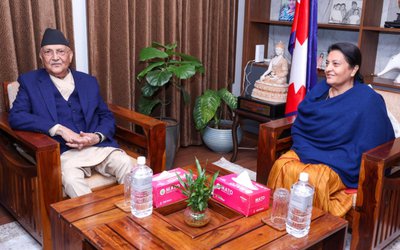More on Interview




SHISHIR KOIRALA, under secretary at the Water and Energy Commission (WECS), spoke to New Spotlight in context of the World Water Day.
As Nepal is facing problems in water supply, how does the World Water Day 2012 make any difference in the current crunch?
This is a day to disseminate the importance of water in human life. This year, it is more important for us as the theme is Water and Food Security. We are also going to organize various programs focusing on impact of climate of change in the water supply like our country.
In what ways are the days like World Water Day important?
Such days are important. However, the importance of water should not be highlighted only on the World Water Day. Instead of talking about the agenda of water, we need to launch a major project on this day. If the government launches a concrete program to attain the goal of the World Water Day, it will have a meaning. WECS has been taking the leadership to celebrate the World Water Day for the last three years. Earlier, the day used to be celebrated by some INGOs and NGOs, organizing some rallies and talk programs. Because of the leadership role played by WECS, we are able to bring various government and other agencies together. Earlier, the day only helped to enhance the profile of NGOs to their international organizations.
What do you say of this year’s program?
This is not a one day discussion or symposium. The World Water Day is a day to launch some major programs. We have to go for long term thinking, instead of short term goals. The country has Water Resources Act which gives priority in seven areas. Similarly, there is a long term policy. Drinking water is a basic necessity and this is our first priority. Irrigation is another priority. This is related to food productions.
How do you evaluate the projects and programs implemented in water resource sectors?
We have implemented several programs and projects in the country. However, we are still to have adequate reasons to get satisfied with water and power sector. We are facing drinking water crisis as well as shortage of water in irrigation. This is because of lack of coordination among government and Nepal’s development partners.
What do you mean by lack of coordination?
There is a lack of coordination in the sense that the projects are developed not as per the need and priority of Nepal. My feeling is that Nepal’s development partners seem to ignore our suggestions and ideas. This is the reason some water related projects failed to address the needs of the people. As long as the projects and development programs are not implemented with close coordination with Nepalese bureaucracy, they will not bring tangible results. Although Nepal’s development partners often express publicly that they are here to support Nepal’s needs and requirements, this has not been happening in the stage of formulation and implementation of the projects. Water related projects and programs are not exceptions.
On what grounds are you saying this?
I said the projects failed to bring the expected outcomes because water related projects are not formulated as per the need of people. We have just implemented prescribed projects. On our part, we have rarely discussed on whether the projects are in our best interests. We have also certain handicaps. Even the projects related to water have the same situation. We need to make commitments that water related projects needs to be implemented as per our needs.







